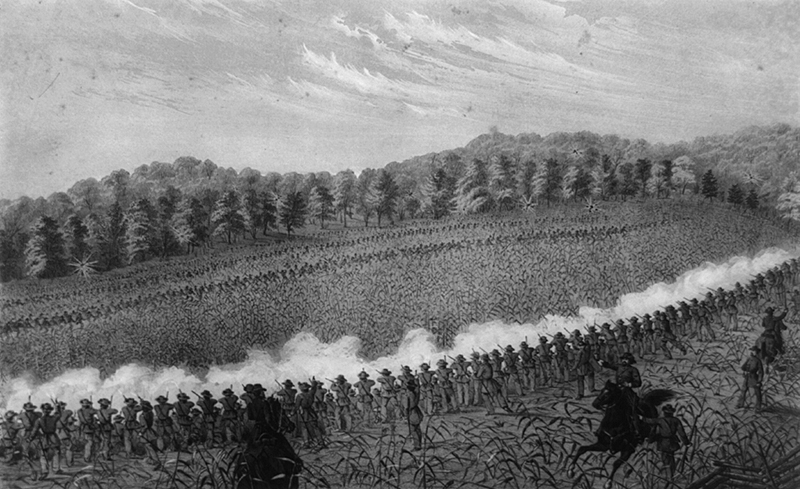Perryville, Battle of, was an important battle of the American Civil War (1861-1865). The battle, named after a town on the battlefield, was fought in central Kentucky on Oct. 8, 1862. Union troops led by General Don Carlos Buell fought a Confederate army led by General Braxton Bragg. Neither side won, but after the battle, Bragg retreated and the Confederate troops abandoned Kentucky.
Background.
In the summer of 1862, Confederate generals Braxton Bragg and Edmund Kirby Smith planned an invasion of Kentucky. Kentucky was a Union state, but many of its residents were sympathetic to the South. Bragg and Smith hoped that the invasion would draw General Buell’s Union troops away from the rail center of Chattanooga, Tennessee, and help the Confederates recruit soldiers from Kentucky.

On August 14, Smith and his 10,000 troops left Knoxville, Tennessee, and headed north toward Kentucky. Two weeks later, Bragg and his 30,000 troops left Chattanooga and also marched toward Kentucky. In early September, Smith occupied Lexington, Kentucky, and Frankfort, the Kentucky capital. In late September, Bragg marched to Bardstown, Kentucky, hoping to unite with Smith’s army. However, Smith remained in the Lexington-Frankfort area. Bragg then left his army at Bardstown, put it under the command of General Leonidas Polk, and joined Smith in Frankfort to witness the inauguration of a Confederate governor of Kentucky.
While Bragg and Smith were marching toward Kentucky, Buell left northern Alabama—within striking distance of Chattanooga—and went north to meet the Confederates. By September 25, Buell’s army had marched through Tennessee and reached Louisville, Kentucky. On October 1, Buell sent about 20,000 of his troops toward Frankfort to make the Confederates think he was attacking there. These troops interrupted the inauguration ceremony that Bragg was attending.
The rest of Buell’s army, about 60,000 soldiers, marched toward Polk’s men at Bardstown. Polk realized that he was outnumbered and retreated his troops about 30 miles (50 kilometers) southeast to Perryville. However, the Confederate troops were scattered, and Bragg still thought that the main part of Buell’s army was going to attack at Frankfort. Because of this, Polk would have only 16,000 men at Perryville.
Battle.
On October 8, the Union army, while searching for water in a drought-stricken area, met the Confederates just west of Perryville. At dawn, Union troops led by General Philip Sheridan attacked the Confederates and gained control of a creek in the middle of the battlefield. While Sheridan was fighting the Confederates, Buell was headquartered a couple of miles west, waiting for the rest of his troops to arrive.
Later that morning, Bragg arrived at Perryville and took command of the Confederate army. Still believing that most of Buell’s army was heading for Frankfort, Bragg ordered Polk’s outnumbered army to attack the Union troops at the northern end of the battlefield. That afternoon, the Confederate attack hit Union troops who had never fought in a battle before. The new soldiers fled at first, but the Union army eventually stopped the Confederate advance after reinforcements arrived. The Confederates also attacked the center of the Union lines, but Sheridan held his ground and later pushed back the Confederates.
At the south end of the battlefield, Confederate General Joseph Wheeler paraded his cavalry in front of the Union troops to make them believe that Wheeler had more men than he actually did. The Union troops were tricked and did not attack.
Although Buell was only a couple of miles from the battlefield, a combination of wind and land features prevented him from hearing the noise of the battle. Late in the afternoon, a messenger told Buell that the battle was occurring, but it was too late in the day for Buell to launch an effective attack. That night, Bragg finally realized that he was outnumbered, and he retreated his army from Perryville.
Aftermath.
During the course of the battle, the Union suffered about 4,200 casualties, and the Confederates about 3,400. On October 10, Bragg united with Smith at Harrodsburg, Kentucky. The Confederates retreated from Kentucky, eventually arriving in Murfreesboro, Tennessee. Despite repeated urgings from Washington, D.C., Buell did not pursue Bragg, and in late October, General William S. Rosecrans replaced Buell. Rosecrans and Bragg would fight from Dec. 31, 1862, to Jan. 2, 1863, at the Battle of Stones River (or Battle of Murfreesboro).
See also Bragg, Braxton ; Civil War, American ; Sheridan, Philip Henry ; Smith, Edmund Kirby .
